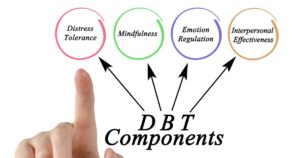
Transitioning from a structured treatment program back into daily life is a pivotal moment in any individual’s recovery journey. During this time, the chances of relapse are higher, and the support systems you rely on can make or break your success. That is where aftercare planning comes in.
Aftercare programs are designed to offer the guidance, structure, and tools necessary to maintain long-term sobriety. One key element that has gained prominence in these programs is the integration of dialectical behavior therapy techniques (DBT), which can be particularly effective in preventing relapse and supporting recovery.
The Importance of Aftercare in Long-Term Recovery
After completing a formal treatment program, individuals face a significant challenge: maintaining the progress they have made. Statistics suggest that between 40% and 60% of individuals experience relapse within the first few months after treatment, making this a critical period in their recovery.

An aftercare plan for substance abuse is designed to bridge the gap between treatment and independent life. It offers continued support, resources, and monitoring to help individuals stay on track.
Aftercare programs offer various forms of support:
- Outpatient programs: These include regular therapy sessions, group meetings, and professional monitoring to ensure continued progress.
- Sober living homes: These provide a stable, substance-free environment where individuals can live while continuing their recovery journey.
- Support groups: Programs such as Alcoholics Anonymous (AA) and Narcotics Anonymous (NA) play a vital role in offering peer support.
These components work together to create a safety net for individuals as they transition from intensive treatment back into the real world, where triggers and temptations can be overwhelming.
Understanding Dialectical Behavior Therapy
Dialectical Behavior Therapy, or DBT, is a cognitive-behavioral treatment that was initially developed to treat individuals with borderline personality disorder. Over time, it has been adapted and found to be highly effective for individuals struggling with substance use disorders. DBT emphasizes four key techniques: mindfulness, distress tolerance, emotional regulation, and interpersonal effectiveness.
- Mindfulness in addiction recovery helps individuals stay present in the moment, reducing the risk of relapse by keeping them focused on their recovery.
- Distress tolerance techniques are vital for managing cravings and high-stress situations, which can otherwise trigger a relapse.
- Emotional regulation in recovery allows individuals to control their emotional responses, making it easier to navigate the ups and downs of life without resorting to substance use.
- Interpersonal effectiveness focuses on improving communication and relationship-building skills, which are often damaged during active addiction.
By integrating DBT for addiction recovery into aftercare planning, individuals gain powerful tools to manage their emotions, handle stress, and build healthy relationships, all of which are essential for long-term sobriety.
How DBT Techniques Enhance Aftercare Plans
Dialectical behavior therapy can be tailored to fit the unique needs of each person in recovery. The core dialectical behavior therapy techniques provide practical strategies to help individuals navigate real-world situations.

- Mindfulness: This technique helps individuals stay focused on the present moment, making it easier to avoid relapse triggers. For example, practicing mindfulness can help a person recognize when they are experiencing cravings and take steps to manage them before they escalate.
- Distress Tolerance: Recovery can be emotionally challenging, and stress is often a key factor in relapse. Distress tolerance techniques help individuals cope with stress in healthier ways. For instance, using breathing exercises or grounding techniques can diffuse overwhelming emotions and prevent impulsive decisions.
- Emotional Regulation: Addiction often stems from an inability to manage emotions effectively. By learning how to regulate emotional responses, individuals in recovery can better handle life’s ups and downs without turning to substances for relief. Someone who learns emotional regulation might use journaling or therapy to work through intense emotions rather than seeking out alcohol or drugs.
- Interpersonal Effectiveness: Healthy relationships are a critical aspect of long-term recovery. This DBT technique helps individuals improve their communication skills and rebuild relationships that may have been damaged by addiction. Whether it’s learning to set boundaries or communicating needs more effectively, interpersonal effectiveness can lead to healthier, more supportive relationships.
Each of these techniques plays a critical role in preventing relapse and supporting long-term sobriety. Together, they form a comprehensive set of tools that individuals can use to face the challenges of life after treatment.
Components of an Effective Aftercare Plan
An effective aftercare plan addresses all areas of life that may impact recovery, providing a holistic approach to maintaining sobriety.
- Peer Support Services: Participation in recovery groups like AA, NA, or SMART Recovery provides individuals with a vital support network for maintaining sobriety. Connecting with others who are on the same journey offers encouragement, accountability, and a sense of belonging.
- Ongoing Therapy: Continued therapy, especially incorporating DBT, helps individuals address the root causes of their addiction. Whether through individual sessions or group counseling, ongoing therapy provides a safe space to work through challenges and develop effective coping strategies.
- Sober Living Environments: Sober living homes offer a substance-free environment where individuals can live while continuing their recovery journey. These homes help reinforce sobriety through peer support and structure, reducing the likelihood of relapse.
- Relapse Prevention Techniques: A key element of any aftercare plan is a robust relapse prevention strategy. This includes identifying triggers, developing coping mechanisms, and having a crisis management plan in place. The goal is to anticipate challenges and be prepared to handle them without returning to substance use.
The Role of Family Support in Aftercare
Family support plays an essential role in recovery. Often, addiction damages relationships, and part of the recovery process involves rebuilding trust and establishing healthier dynamics. Family therapy can be a powerful tool in addressing underlying issues and helping loved ones understand the recovery process.
For many individuals, their family is their primary support system. Involving them in aftercare planning can create a more supportive home environment, which is essential for maintaining sobriety. Education and counseling can help family members learn how to best support their loved ones while also taking care of their own emotional needs.

Moving Forward: Planning for a Lifetime of Sobriety
Aftercare planning is not a one-size-fits-all approach. It requires careful consideration of each individual’s unique needs, challenges, and goals. By incorporating dialectical behavior therapy techniques into an aftercare plan, individuals are equipped with the skills necessary to manage emotions, handle stress, and maintain healthy relationships, all of which are vital for long-term recovery.
At American Treatment Network, we believe in empowering individuals to build a life of sobriety that they are proud of. Let’s take the next step in your recovery journey together by creating a personalized aftercare plan that works for you. Contact us today to start planning for your future.


